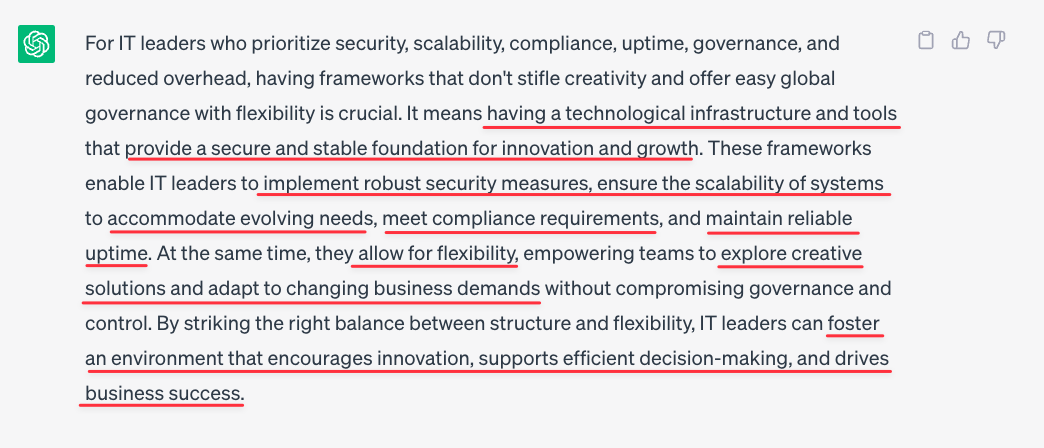Value proposition: How to know what to say
There's one thing that all master persuaders know...
It's not how to use words...
It's not how to hypnotize people...
It's not even how to use our own cognitive biases...
It's directional power.
What I mean by that is the direction of your thought or argument is way more powerful than its specifics.
Bold claims lead. Weak ones trail.
Scott Adams says:
This is why as we mentioned yesterday, in your value proposition the first things to get right are directional in nature:
- What to say (the points to hit)
- Where to say it (their priority)
So, while working on my client project, I experimented using ChatGPT to help guide me in the right direction.
I came up with a super simple prompt.
"What does it mean for PERSONA who want OUTCOMES to get VALUE?"
This obviously means that you first have to be clear on who your target customer is, what goals they want to achieve and what value you deliver that helps with those.
Here's an example for IT leaders:
 |
This is really helpful to start generating ideas. The response will be broad but it will guide you with the directional aspect of your value prop. It will start answering the questions of 1) What to say, and 2) Where to say it.
Here's the response to the previous prompt:
 |
I've highlighted the points I would hit in my value proposition.
If not all of them, at least the most important once. Notice the hierarchy and prioritization. We can't trust ChatGPT 100% but a simple cross-reference with our own research and we'd instantly know how to begin structuring our copy.
If you're struggling with finding the right direction for your claim, arguably the most important part of the argument, try this.
Quote and reflection of the day:
To get what you look for, be of service. The value you bring to the table has to come back to the source. Everything is in impermanent balance.
Cheers,
Chris
Hi, I'm Chris, The Conversion Alchemist
I'm the founder and chief conversion copywriter at Conversion Alchemy. We help 7 and 8 figure SaaS and Ecommerce businesses convert more website visitors into happy customers. Unpacking Meaning is the only newsletter B2B SaaS leaders need to sharpen messaging and shorten sales cycles. A weekly email with one field-tested idea you can use to boost conversions without raising ad spend, make value obvious and friction low, and align teams with clear, scalable messaging.
Read online Welcome to Unpacking Meaning. If you received this from a friend and enjoy it, subscribe here. How to stop guessing what to say to your ICPs I ran a roundtable yesterday with a group of founders, PMMs, and early-stage marketers. We were talking about messaging and positioning, and within about ten minutes, three different conversations coalesced into the same problem. One person had just raised a big round. Their product had evolved significantly, but messaging hadn’t kept up....
Read online Welcome to Unpacking Meaning. If you received this from a friend and enjoy it, subscribe here. Your website is becoming a sales conversation Nearly every B2B buyer visits your website before they ever talk to sales. And not just once. They’re there multiple times. Researching, comparing, and forming opinions. By the time they show up to a demo, they already think they know what you do, how you’re different, and whether you’re a fit. The call is just to confirm what they think they...
Read online Welcome to Unpacking Meaning. If you received this from a friend and enjoy it, subscribe here. How to frame a problem people can't ignore Last week I talked about how neutral messaging isn't just forgettable—neuroscience shows it literally fails to engage the brain's emotional and attentional systems. And how the right kind of attention comes from combining your unique point of view (what you see that most don't) with strong value messaging (what's specifically in it for them)....